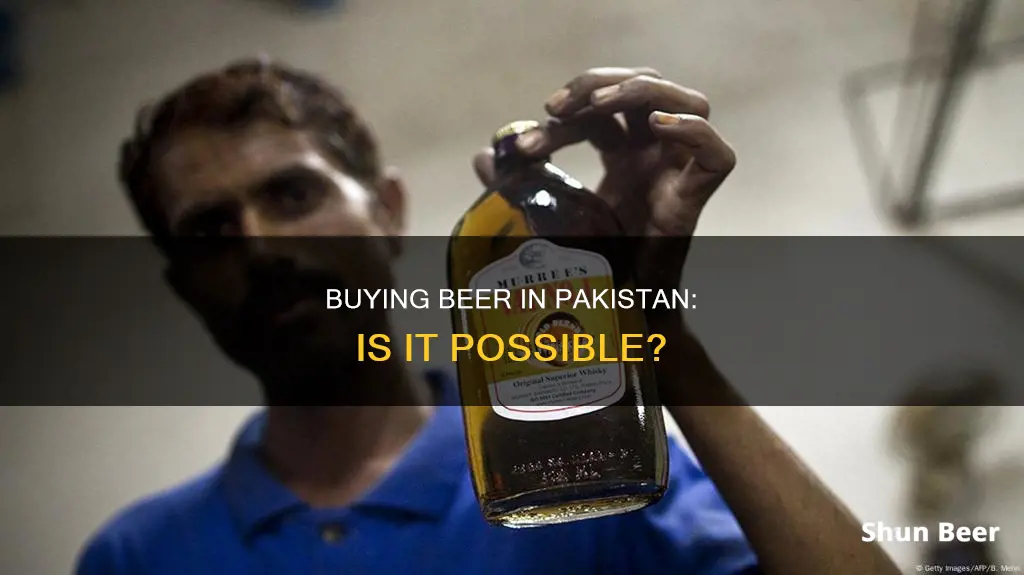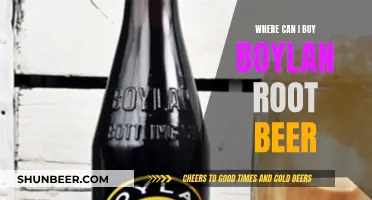
Alcohol consumption has been controlled in Pakistan since 1977 when the government enacted prohibition laws, with isolated exemptions for bars and clubs. Drinking alcohol is forbidden for Muslims in Pakistan, but non-Muslims can consume alcoholic beverages after obtaining a license from the government. This has led to a thriving black market, with many drinkers turning to illicit liquor or moon shine. The largest legal supplier of alcohol in Pakistan is the Murree Brewery, which produces a range of beers and spirits catering to non-Muslims and foreign residents.
| Characteristics | Values |
|---|---|
| Legality of buying beer | Illegal for Muslims, legal for non-Muslims with a license |
| Beer prices | Surged during the COVID-19 pandemic |
| Beer availability | Available in wine shops in Sindh province, black market in other areas |
| Beer brands | Murree Brewery Beer, Pils by Muree brewery |
What You'll Learn

Non-Muslims can buy beer in Pakistan
Drinking alcohol in Pakistan is a complicated affair. While it is illegal for Muslims who make up about 97% of the population, non-Muslims can consume alcoholic beverages after obtaining a license from the government. This makes Pakistan the only place in the world where a license is required to drink. Additionally, non-Muslim foreigners are allowed to order alcohol in some hotels.
There are a few options for non-Muslims looking to purchase beer in Pakistan. One option is to obtain a liquor permit, which can be applied for upon arrival in the country. The permit can be obtained from the Excise and Taxation Office and costs a couple of dollars. With this permit, you can buy 6 units of locally produced alcohol from designated outlets in Islamabad, such as the Marriott, the Best Western, and the Serena Hotel. These hotels may require you to provide proof of foreign identification.
Another option is to purchase beer from "wine shops," which are unique to the Sindh province in Pakistan. These shops are allowed to be owned and operated by non-Muslims and cater to non-Muslim customers. However, it is important to note that drinking is still considered taboo in Pakistan, and there is a social stigma associated with alcohol consumption.
It is worth mentioning that the coronavirus pandemic has impacted the availability and prices of alcohol in Pakistan. The pandemic has led to an increase in alcohol consumption, and prices for both legal and black-market alcohol have surged. Additionally, the closure of hotels and liquor stores during Ramadan has further limited the options for purchasing alcohol.
Buying Beer on Sundays in Texas: What's the Deal?
You may want to see also

Muslims are forbidden from buying beer in Pakistan
Pakistan has some of the strictest liquor laws in the world. Alcoholic beverages are banned for Muslims in the country, which has a Muslim population of over 97%. Drinking alcohol is considered "'un-Islamic'", and selling alcohol to Muslims can result in severe punishments. The prohibition on alcohol for Muslims in Pakistan came into effect in 1977 under the populist government of Zulfikar Ali Bhutto, who was under pressure from various right-wing political parties to enact such laws. The ban was strengthened in 1979 under the regime of General Zia-ul-Haq.
Non-Muslims in Pakistan can consume alcohol after obtaining a license from the government, the only place in the world where such a license is required. Foreigners can also buy alcohol in some hotels. The sole authorised bar in the country is located in Peshwar, and there is a legal distillery in the country, the Murree Brewery, which has a cult-like following in the US.
Despite the strict laws, Pakistan has a thriving black market for alcohol, and many Muslims in the country do drink. "Wine shops", owned and operated by non-Muslims, are allowed in certain regions, and there are reports of non-Muslims selling alcohol to Muslims. The coronavirus pandemic and the lockdown during Ramadan in 2020 caused alcohol shortages in the country, and prices surged.
Michigan Beer Laws: Buying Before Noon
You may want to see also

Black market beer is available in Pakistan
Alcohol is largely prohibited for Muslims in Pakistan, who make up around 97% of the population. However, this doesn't stop a black market from supplying illicit liquor to those who want it.
In the southern Sindh province, non-Muslims are allowed to own and operate so-called "wine shops", which sell alcohol. However, one worker at such a shop, Rahul, said he delivers alcohol to anyone who will pay, regardless of their religion. He also said he has to be careful because people can try to get him in trouble.
In other parts of the country, Muslim drinkers must buy alcohol on the black market. This alcohol is often expensive and sometimes diluted with water. During the coronavirus pandemic, prices for black market alcohol surged, and drinkers were forced to source homemade alternatives that were frequently unsafe.
Non-Muslims can consume alcoholic beverages in Pakistan after getting a license from the government. Foreigners can also order alcohol in some hotels, and the sole authorized bar in the country is at the Pearl Continental in Peshwar. The Murree Brewery is the nation's only legal distillery and has a cult-like following in the US.
Buying Beer on Sundays in Austin, Texas: What's Allowed?
You may want to see also

Beer is available in hotels in Pakistan
Alcoholic beverages are banned in Pakistan for Muslims, who make up over 97% of the population. However, non-Muslims can consume alcohol after obtaining a license from the government, and non-Muslim foreigners are allowed to order alcohol in some hotels. The Marriott Hotel, Islamabad, for example, serves alcohol to non-Muslim guests. The Best Western and the Serena Hotel in Islamabad also serve alcohol to non-Muslims. In addition, the Pearl Continental in Peshwar has the distinction of being the only authorised bar in the country.
The Murree Brewery, established in 1860, is the nation's only legal distillery. It has a cult-like following in the US after Scout Willis was caught with a can of Murree beer while underage in New York City. The brewery produces a range of beers and spirits catering to Pakistan's non-Muslims and foreign residents.
In Pakistan's southern Sindh province, "wine shops" are allowed to be owned and operated by non-Muslims who pay a heavy tax. These shops are unique to the Sindh province and are not found in the rest of the country. In other parts of Pakistan, Muslim drinkers often resort to the black market for alcohol.
When to Buy Beer in Memphis on Sundays
You may want to see also

The Murree Brewery is Pakistan's largest legal beer supplier
Alcoholic beverages are banned in Pakistan for Muslims, who make up more than 97% of the population. However, non-Muslims can consume alcohol after obtaining a license from the government, and non-Muslim foreigners are permitted to order alcohol in some hotels.
The Murree Brewery is the nation's only legal distillery and the largest legal beer supplier in Pakistan. It was founded by the British in 1860 to meet the demands of British military and civilian personnel at Ghora Gali near the resort town of Murree. The company is managed by the family of Edward Dyer, whose son, Colonel Reginald Dyer, was the British army officer responsible for the Jallianwala Bagh massacre.
Murree Brewery has two manufacturing units, one in Rawalpindi, Punjab, and the other in Hattar, Khyber Pakhtunkhwa. It has three divisions: Liquor (alcoholic and non-alcoholic drinks), Tops (food items, mineral water, and fruit juices), and Glass (glass jars and bottles). In 2015, the company produced 10 million litres of beer, along with hundreds of tons of single malt whisky, vodka, and brandy.
Murree Beer is the most popular beer in Pakistan, often referred to as "Pakistan's legendary beer". It has been awarded medals for excellence internationally and is exported to India and Bangladesh. The company also produces other alcoholic beverages, including Classic Beer, Millennium Beer, Wheat Beer, Special Strong Brew, Stout Beer, Lite Export Pils, and various whiskies, vodkas, gins, and brandies.
In addition to its beverage business, Murree Brewery has a cult-like following in the US, sparked by an incident involving Scout Willis, daughter of Hollywood actors Bruce Willis and Demi Moore. In 2012, Willis was arrested in New York City for drinking a can of Murree Beer while underage, generating significant publicity for the brand. This led to the company lining up distributors in the USA and Dubai as part of its expansion plans.
Beer Availability at UCLA Football Games
You may want to see also
Frequently asked questions
Beer is largely prohibited for Muslims in Pakistan, who make up over 97% of the population. However, non-Muslims can buy beer in certain regions, such as in \"wine shops\" in the southern Sindh province.
As with beer, other alcoholic drinks are also prohibited for Muslims in Pakistan. However, non-Muslims can purchase alcohol in hotels by providing their foreign ID. They can also apply for a liquor permit on arrival, which costs a couple of dollars and entitles them to buy 6 units of locally produced alcohol from outlets in Islamabad.
The penalty of 80 lashes for drinking alcohol was repealed in 2009. However, drinking is still illegal for Muslims in Pakistan and is considered a taboo topic.
The largest legal supplier of alcohol in Pakistan is the Murree Brewery, which produces a range of beers and spirits catering to non-Muslims and foreign residents.
The COVID-19 pandemic has caused alcohol prices in Pakistan to surge, with local beer and liquor prices tripling during the 2020 lockdown.







